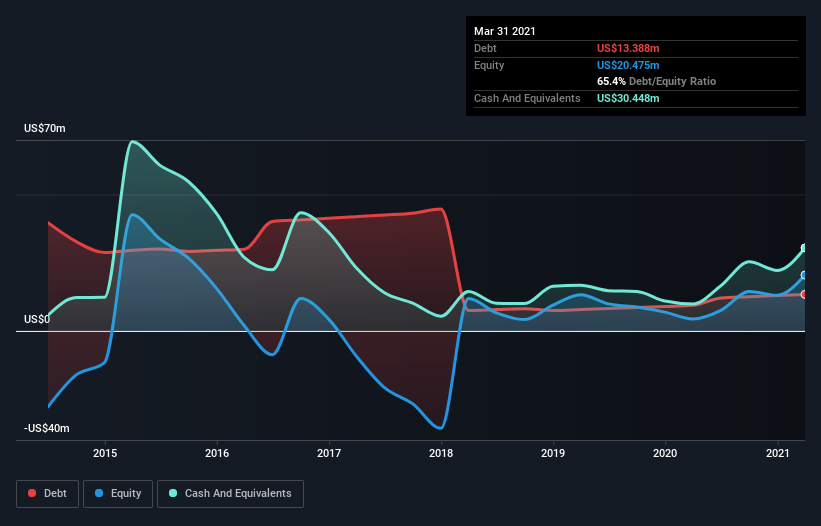
Legendary fund manager Li Lu (who Charlie Munger backed) once said, 'The biggest investment risk is not the volatility of prices, but whether you will suffer a permanent loss of capital.' It's only natural to consider a company's balance sheet when you examine how risky it is, since debt is often involved when a business collapses. We can see that Avinger, Inc. (NASDAQ:AVGR) does use debt in its business. But is this debt a concern to shareholders?
Why Does Debt Bring Risk?
Generally speaking, debt only becomes a real problem when a company can't easily pay it off, either by raising capital or with its own cash flow. In the worst case scenario, a company can go bankrupt if it cannot pay its creditors. However, a more frequent (but still costly) occurrence is where a company must issue shares at bargain-basement prices, permanently diluting shareholders, just to shore up its balance sheet. Of course, debt can be an important tool in businesses, particularly capital heavy businesses. When we think about a company's use of debt, we first look at cash and debt together.
Check out our latest analysis for Avinger
How Much Debt Does Avinger Carry?
As you can see below, at the end of March 2021, Avinger had US$13.4m of debt, up from US$9.37m a year ago. Click the image for more detail. But it also has US$30.4m in cash to offset that, meaning it has US$17.1m net cash.

A Look At Avinger's Liabilities
According to the last reported balance sheet, Avinger had liabilities of US$7.24m due within 12 months, and liabilities of US$14.4m due beyond 12 months. Offsetting these obligations, it had cash of US$30.4m as well as receivables valued at US$1.53m due within 12 months. So it actually has US$10.3m more liquid assets than total liabilities.
This short term liquidity is a sign that Avinger could probably pay off its debt with ease, as its balance sheet is far from stretched. Succinctly put, Avinger boasts net cash, so it's fair to say it does not have a heavy debt load! There's no doubt that we learn most about debt from the balance sheet. But it is future earnings, more than anything, that will determine Avinger's ability to maintain a healthy balance sheet going forward. So if you're focused on the future you can check out this free report showing analyst profit forecasts.
Over 12 months, Avinger made a loss at the EBIT level, and saw its revenue drop to US$9.1m, which is a fall of 5.2%. We would much prefer see growth.
So How Risky Is Avinger?
Statistically speaking companies that lose money are riskier than those that make money. And in the last year Avinger had an earnings before interest and tax (EBIT) loss, truth be told. And over the same period it saw negative free cash outflow of US$15m and booked a US$22m accounting loss. Given it only has net cash of US$17.1m, the company may need to raise more capital if it doesn't reach break-even soon. Even though its balance sheet seems sufficiently liquid, debt always makes us a little nervous if a company doesn't produce free cash flow regularly. The balance sheet is clearly the area to focus on when you are analysing debt. However, not all investment risk resides within the balance sheet - far from it. We've identified 4 warning signs with Avinger (at least 2 which are a bit concerning) , and understanding them should be part of your investment process.
When all is said and done, sometimes its easier to focus on companies that don't even need debt. Readers can access a list of growth stocks with zero net debt 100% free, right now.
If you decide to trade Avinger, use the lowest-cost* platform that is rated #1 Overall by Barron’s, Interactive Brokers. Trade stocks, options, futures, forex, bonds and funds on 135 markets, all from a single integrated account. Promoted
If you're looking to trade Avinger, open an account with the lowest-cost platform trusted by professionals, Interactive Brokers.
With clients in over 200 countries and territories, and access to 160 markets, IBKR lets you trade stocks, options, futures, forex, bonds and funds from a single integrated account.
Enjoy no hidden fees, no account minimums, and FX conversion rates as low as 0.03%, far better than what most brokers offer.
Sponsored ContentNew: Manage All Your Stock Portfolios in One Place
We've created the ultimate portfolio companion for stock investors, and it's free.
• Connect an unlimited number of Portfolios and see your total in one currency
• Be alerted to new Warning Signs or Risks via email or mobile
• Track the Fair Value of your stocks
This article by Simply Wall St is general in nature. It does not constitute a recommendation to buy or sell any stock, and does not take account of your objectives, or your financial situation. We aim to bring you long-term focused analysis driven by fundamental data. Note that our analysis may not factor in the latest price-sensitive company announcements or qualitative material. Simply Wall St has no position in any stocks mentioned.
*Interactive Brokers Rated Lowest Cost Broker by StockBrokers.com Annual Online Review 2020
Have feedback on this article? Concerned about the content? Get in touch with us directly. Alternatively, email editorial-team (at) simplywallst.com.
About NasdaqCM:AVGR
Avinger
A commercial-stage medical device company, designs, manufactures, and sells a suite of image-guided and catheter-based systems used by physicians to treat patients with peripheral artery disease (PAD) primarily in the United States and Germany.
Moderate with mediocre balance sheet.
Similar Companies
Market Insights
Community Narratives




